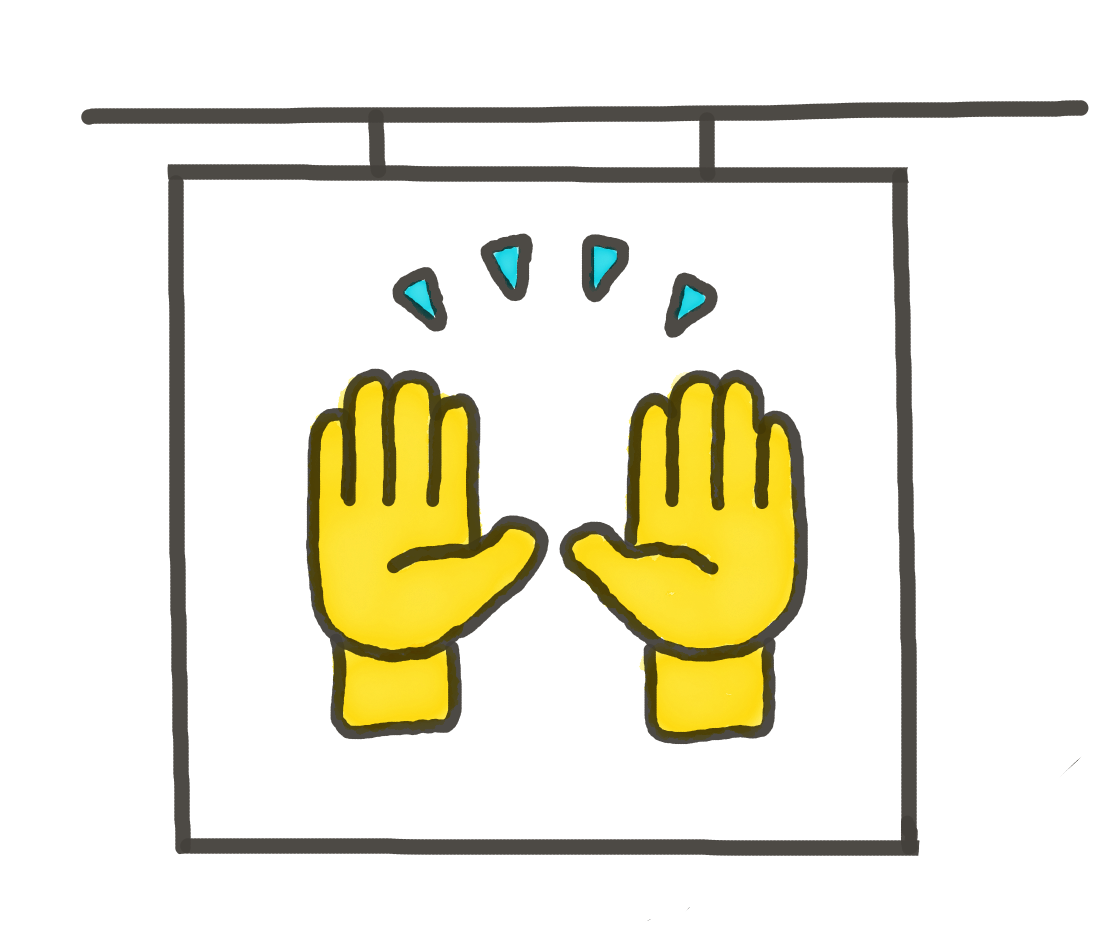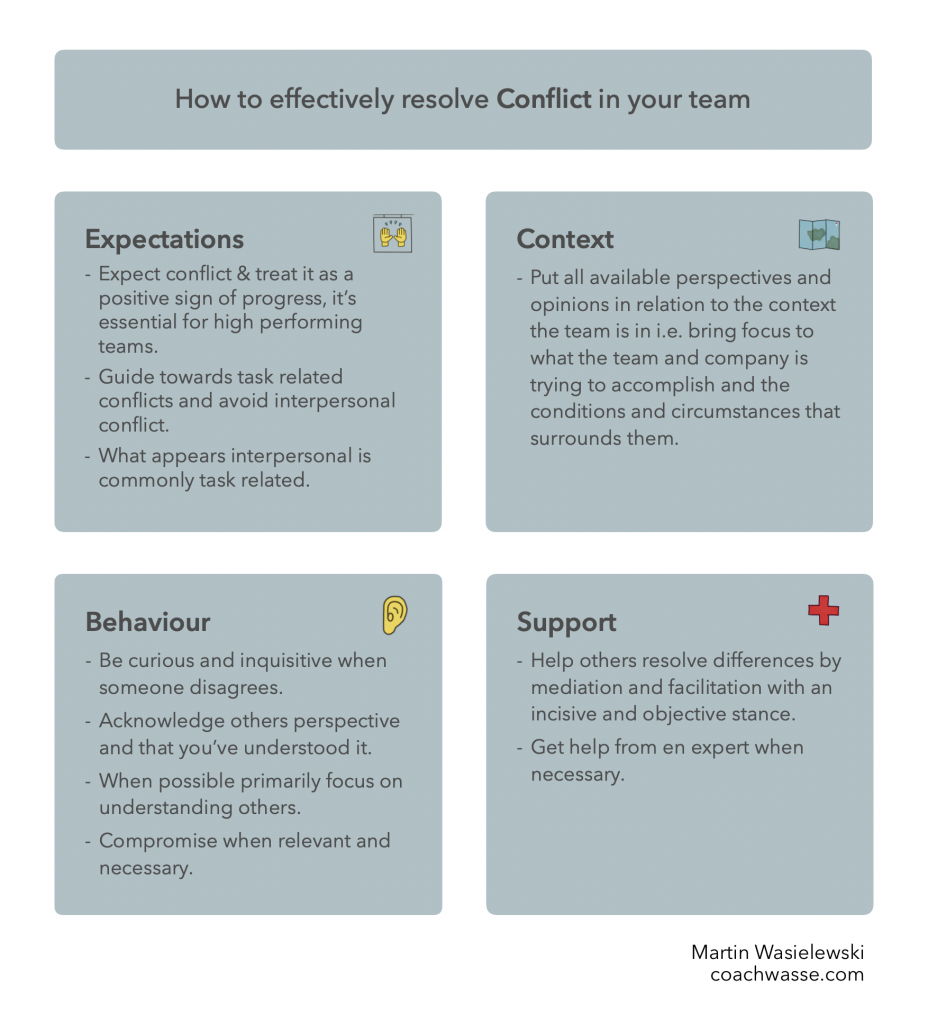If you’ve been part of a team or are familiar with how group dynamics play out you should be aware that conflict is an inevitable occurrence in any team. According to research by Susan Wheelan 49% of work teams and 60% of leadership teams have not found effective ways to deal with conflict! Working with and coaching a multitude of teams I’ve repeatedly observed that many people find conflicts highly uncomfortable and difficult to address. Because of this and what characterises an effective team (spoiler: frequent and brief periods of task conflict that’s resolved effectively, among other things) I’ve spend considerable time learning, developing and teaching tools and techniques that are highly effective in managing task conflicts in teams. In this post I will share some of them.
I’ve categorised my learnings and tools into four distinct areas – Expectations, Context, Behaviour and Support. And I’ll jump strait into the first one.
Expectations

The first and foremost step is to separate between interpersonal and task conflict. The latter refers to when a minimal of two people are having a difference of opinion about a work or task related topic e.g. they can’t agree on what problem the team should focus on solving or how to implement a specific product feature. Research clearly tells us that this type of conflict is essential for productive and effective teams and should be encouraged. Interpersonal conflict is when disagreements become personal due to incompatibility. Research clearly shows that these conflicts leads to disruption and ineffectiveness in a team and should be avoided.
Based on the science it becomes evident that it’s key that everyone in a team treat disagreements as a positive sign of progress and steers all disagreements towards being about their work. It’s also common that conflicts that appear to be interpersonal are in fact related to various team related circumstances e.g. unclarity or misalignment around goals, roles or information, which thus makes them task related. This is a great realisation and serves as a healthy reminder during any disagreement.
Context

During disagreements context matters profoundly. What outcomes you primarily should focus on or how you should implement a feature or technical component differs if you’re in the music streaming business or in the business of financial trading. By evaluating all available perspectives and opinions in relation to both what the team and company is trying to accomplishing will make it easier for everyone to judge what makes most sense in any particular situation.
I’ve repeatedly noticed that when individuals and teams start to pay more attention to their context during disagreements it unties them from making valuable progress. The discussions becomes less focused about who’s right and wrong and that someone needs to win and another needs to loose. Instead it brings focus to the goal and what the team wishes to accomplish and allows everyone to evaluate on what’s more or less relevant.
Behaviour

Certain behaviour is far more favourable compared to other during disagreement. Such as modelling curiosity ; As soon as you notice that there’s a disagreement that prevents you form moving forward shift your mind into learning mode. It’s very likely that either you or someone else will gain insight and learning from it.
Start to listen with the intent to understand instead of listen with the intent to respond with your point or opinion. Do so by putting your perspective aside for the time being, i.e. put it in the mental parking lot. You will likely not forget about it. Now primarily focus on understanding the other person(s) point of view by asking clarifying questions and providing statements as a way to validate that you’ve understood.
Once you’ve understood and acknowledged provide your own perspective on the subject. The likelihood of you being listened to in the same way have increased considerably. This, and reminding yourself and others about the context, will allow all of you to explore the issue and the various opinions in a more objective way.
Support

At times you may be in a position to help other team members during disagreement. When you see members get stuck and have the ability to take an objective stance don’t sit on the side lines. Offer your support and observations. Provide mediation and facilitation by using the tools and techniques in this post and from other sources. When you provide support it’s important that you’re able to be inclusive with all different point of views that’s part of the disagreement.
If you can’t provide or get adequate support from inside the team ask for support from someone outside the team. Preferably from someone that has considerable conflict resolution knowledge and experience.
Summary
If you start practicing the techniques in this post with your team it will accelerate the entire team towards excellence. Below I’ve provided a condensed guide that hopefully will help you on your way. Please share your experiences and learnings with me.
If you need additional help when it comes to creating high performing teams and effective organisations please reach out to me or schedule a free consultation.
